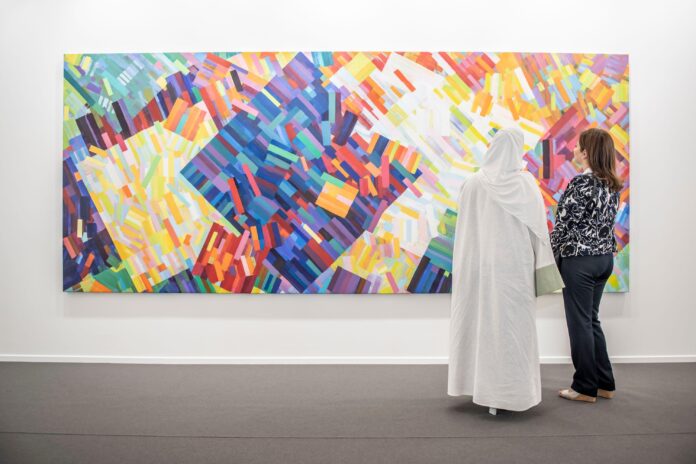During the last global recession, Dubai suffered a debt crisis that forced its sister emirate Abu Dhabi to hand over a $20bn bailout. But as the world once again teeters on the brink of recession, Dubai seems in much better economic fortunes. The economy of the United Arab Emirates (UAE) is estimated to have grown by 7.6% last year, the highest in 11 years, according to the UAE Central Bank. Construction sites for real estate projects long-abandoned have shuddered back to life as demand for property has skyrocketed and other industries, such as recreation and culture, are seeing decreases in inflation this year.
It is set against this backdrop that Art Dubai (1-5 March) opens its biggest edition yet, returning to full force for the first time since the pandemic. The fair—which specialises in art from the Middle East, North Africa and South Asia—will bring together more than 130 exhibitors this year, with increased participation from leading African and South Asian dealers and an expanded Art Dubai Digital section. “Dubai is rapidly developing into a global financial and technology hub,” says Art Dubai’s artistic director Pablo del Val. “The city is booming.”
One area that has not been booming of late is the crypto market and its related art industry. Last year’s Art Dubai saw the launch of its new digital section: “an annual 360-degree snapshot of the digital art landscape, building bridges between the art and technology worlds, and exploring how artists are utilising new, immersive technologies to collapse the boundaries of the traditional art world”, a statement says. Despite the enduring crypto winter, Art Dubai’s digital section has grown from 17 galleries to 22 this year and has been curated by the Singapore-based arts writer Clara Che Wei Peh.

A still from Nujoom Alghanem’s film Sharp Tools (2017) Courtesy of MORROW collective
“Competition [for a place at Art Dubai Digital] was much tougher this year,” says Anna Seaman, the co-founder and curator of MORROW Collective, which is returning to the fair this year. It will present one booth of art from leading regionally based artists and a second booth, in collaboration with VISA, “showing some of the biggest names in crypto internationally”, Seaman adds. Works on show include a new NFT series by the Emirati artist and poet Nujoom Alghanem, which is derived from her 2017 film Sharp Tools, an artistic documentary about Hassan Sharif, who is widely regarded as the father of contemporary art in the UAE. “Scenes from the film have been laid over each other and accompanied by Alghanem’s poetry—they are beautiful and feel like a piece of Hassan himself,” Seaman says. Prices for the works range from $200-$6,000.
Seaman says the crypto crash has concerned many in the industry but believes it is now easing. “Much of 2022 was a very difficult year,” she says. “However, we understand the volatility of crypto currency and we stay true to our belief that, despite ups and downs, there is a growing market for fine art NFTs.” Mila Askarova, the founder and CEO of Gazelli Art House, whose digital arm GAZELL.iO, the digital arm is also returning to the digital section this year, says the crash has led to a “dampening of mood and means to buy” but adds that “certain patrons and collectors are able to ride out the dips and have been very supportive of the artists we work with during these times.”
Askarova says that there continues to be a growing regional interest in digital art. “Consistency is key in this region and with the dynamic programme we have had via GAZELL.iO this past year, we wanted to make sure we reconnected with our existing audiences as well as meet new ones,” she adds. The gallery is exhibiting Brendan Dawes’ Persian Dreams: Monument ($60,000) which shows two minutes of metamorphosed imagery based on artificial intelligence and algorithmically generated forms from the historic Persian epic poem Shahnameh: The Book of Kings.

Stills from Brendan Dawes’ Persian Dreams: Monument (2023) Courtesy of GAZELL.iO
Meanwhile, the healthy economic upturn and demand for property and services in Dubai is being attributed by many—including The Art Newspaper—to an influx of Russian citizens and money to the emirate, has not imposed sanctions on Russia. The was a huge growth in travel between Moscow and Dubai in 2022 compared to 2019, with some routes seeing 228% more passengers. For the first quarter of 2023, bookings to Dubai for premium class seats on Russian flights are already 103% ahead of the same quarter in 2019, according to travel data company ForwardKeys.
So will Russian money boost sales at this year’s Art Dubai? Both Askarova and Seaman predict it will have little effect for their galleries. “There are no geographical boundaries or divides in the crypto space,” Seaman says. She does however applaud Dubai’s steering through the economic crisis. “The government is agile, shrewd and works hard to make sure that the economy remains strong, even in the most difficult times,” she says.

























